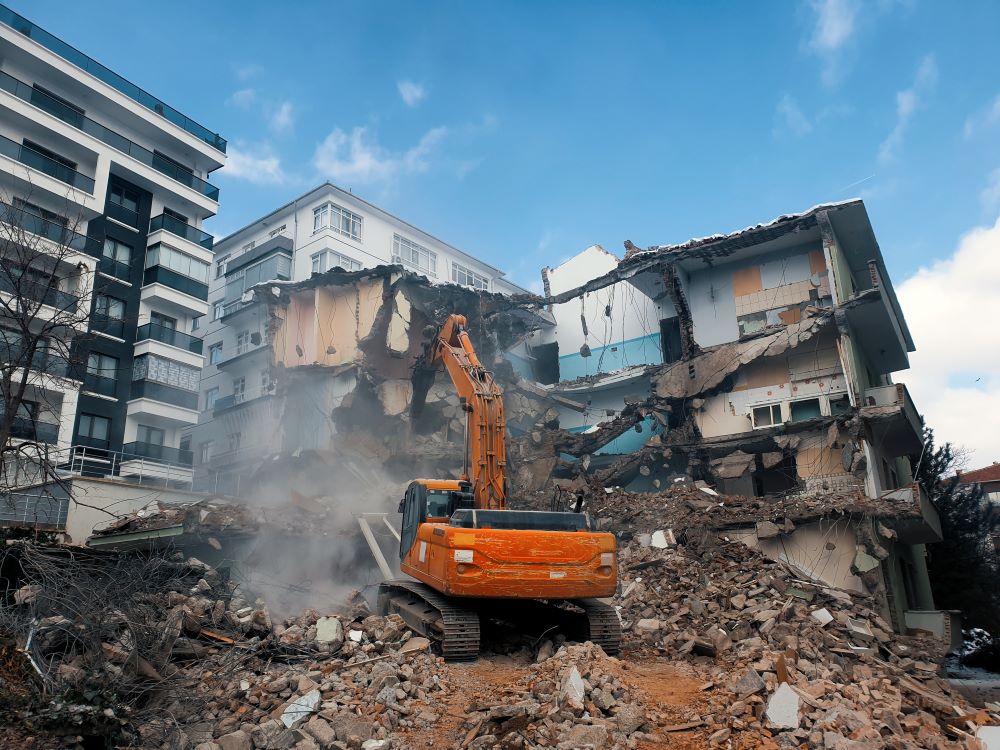
Demolition Best Practices Large-Scale Commercial Services
Particularly when done on a big commercial scale, demolition is a dangerous and complicated operation that has to be carefully planned, carried out, and compliant with industry best practices. If this isn’t done, there might be disastrous outcomes, such as environmental harm, structure collapses, severe injuries, or even fatalities. Because of this, demolition specialists need to be quite knowledgeable about the most recent methods, laws, and safety procedures. They can guarantee that every job is finished safely, effectively, and with the least amount of disturbance to the surrounding environment by adhering to best practices.
OUR SERVICES
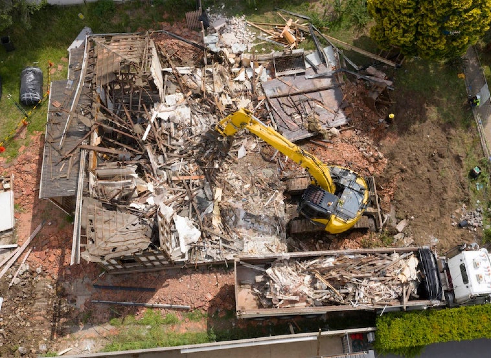
Structure Demolition. Residential, Commercial & Industrial
If your structure poses a health, safety, or environmental risk, demolition can prevent costly citations or fatal accidents. While this may seem daunting, you are just a phone call away from having your residential demolition done professionally, responsibly, and at a great price.
Talk to a Demolition Specialist Now! 916.249.5001
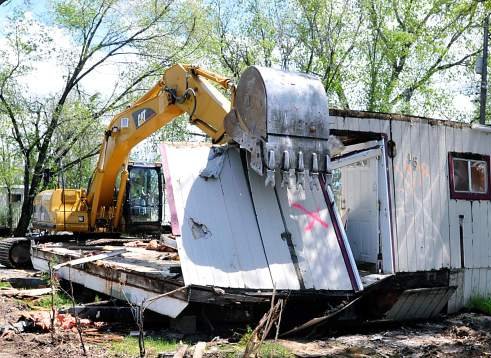
Mobile Home Demolition
We demolish and haul away mobile homes. Any size, anywhere, anyhow. We are fast, clean and competitive. We serve most of Northern California. There are many factors to consider when removing or demolishing your old trailer, mobile home, or manufactured home like: the processes involved, costs, time, contractors, debris, and permits.
Talk to a Demolition Specialist Now! 916.249.5001
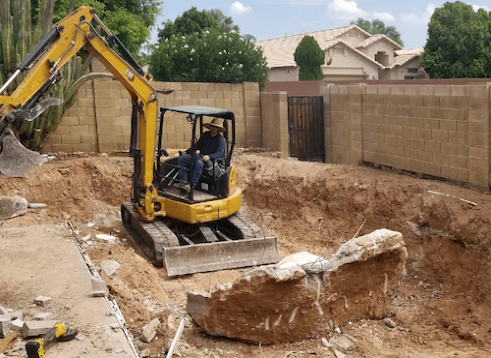
Pool Demolition
When removing a pool in Sacramento, California with the professional demolition team of Maxton Demo, you’re guaranteed peace of mind from beginning to end. From your initial request for an estimate to clean-up, you can expect our pool demolition process that’s completely professional and safe.
Talk to a Demolition Specialist Now! 916.249.5001
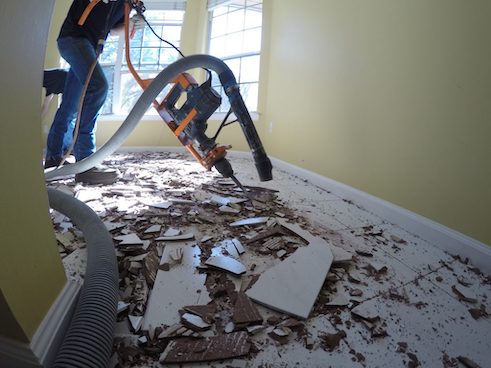
Floor Demolition
Flooring demolition, like any other major home renovation work, requires a specific set of skills and tools to be performed properly. You need experts in flooring demolition to get you the best floors possible. Contact us to find out more about how we can help you today.
Talk to a Demolition Specialist Now! 916.249.5001
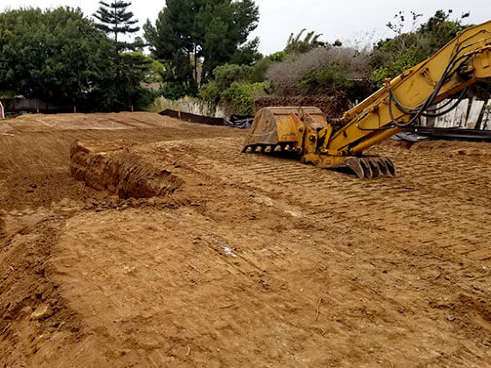
Grading & Excavating
If you need an experienced excavator and grader in Sacramento, call us today. One of the many reasons that residential, commercial, and industrial customers choose to work with us is because we’re able to provide a broad range of services to help construction-related projects get done in less time and at a reduced cost.
Talk to a Demolition Specialist Now! 916.249.5001

Roof Snow Removal
Heavy snow & ice dams can cause significant roof and home damage. Roof Snow removal is our specialty during the winter months. Serving the Sacramento, California area for 10 years, we can get your roof snow removed and promise a quick response and reasonable rates.
Talk to a Demolition Specialist Now! 916.249.5001
Rules And Authorization For Extensive Commercial Demolition
Getting the required licenses and making sure all applicable laws are followed are important initial steps in any major business demolition project. The location, the size and complexity of the construction, and the particular needs of the local authorities may all have a substantial impact on this procedure.
The Occupational Safety and Health Administration (OSHA) at the federal level has developed a thorough set of regulations for demolition operations that include everything from trash disposal and environmental protection to worker safety and management of dangerous chemicals. It is vital for demolition businesses to acquaint themselves with these standards and guarantee that their activities conform to them consistently.
It is frequently necessary to consider state and local rules in addition to federal requirements. These might contain rules pertaining to construction, zoning, the environment, and even particulars about the historic or cultural importance of the building that is being destroyed. Inadequate permissions or protocol compliance may lead to expensive hold-ups, penalties, or even project termination.
Machinery And Equipment Used In Extensive Commercial Demolition
Large-scale commercial demolition projects must be completed successfully, necessitating the employment of technology and specialized equipment built to meet the particular difficulties presented by these kinds of buildings. The demolition business has access to a wide range of sophisticated instruments, including controlled implosion systems, industrial-grade crushers, high-reach excavators, and demolition robots.
The high-reach excavator is one of the most important pieces of equipment in large-scale commercial demolition. These enormous machines enable demolition workers to safely and effectively demolish big buildings and other structures from a safe distance thanks to their long, articulated booms and specialized attachments. High-reach excavators minimize the risk of falls and other risks by removing the need for operators to climb or operate at hazardous heights.
To handle exceptionally risky or difficult jobs, demolition firms may often use specialized robots and remote-controlled equipment in addition to excavators. These cutting-edge devices may be used for selective dismantling of unstable or sensitive components, asbestos removal, and structural weakening. Demolition teams may reduce their risk of injury and guarantee the security of the surrounding area by using this state-of-the-art equipment.
Environmental Factors In Commercial Demolition On A Huge Scale
Environmental implications of large-scale commercial demolition projects are important, and it is the duty of demolition experts to reduce these effects by careful planning and implementation. Every facet of demolition has to be properly thought out, from handling and disposing of hazardous materials safely to putting sustainable waste management plans into practice.
In large-scale commercial demolition, the presence of hazardous elements, including lead, asbestos, and polychlorinated biphenyls (PCBs), is one of the main environmental issues. In order to guarantee the safe removal and containment of these compounds, demolition contractors must follow stringent rules and processes. Improper handling and disposal of these substances may result in major health concerns.
Demolition operations produce enormous volumes of garbage, including metal, wood, concrete, and other construction components, in addition to dangerous pollutants. Recyclable and repurposed materials are given priority by conscientious demolition contractors, which helps to minimize the quantity of debris that gets up in landfills and other disposal sites. Through the implementation of a circular economy strategy in demolition, these organizations may reduce their ecological footprint and foster the sustainable growth of their local communities.
Procedures For Large-Scale Commercial Project Demolition
Large-scale commercial demolition projects must be executed successfully via a methodical, step-by-step process that takes into account a variety of duties and factors. To guarantee the project’s overall safety, effectiveness, and environmental responsibility, every step of the process—from the preliminary site assessment and planning phases to the cleaning and restoration—must be meticulously carried out.
The thorough site evaluation is the initial stage of the demolition procedure. Experts in demolition will closely inspect the building, the area around it, and any possible risks or roadblocks that might affect the process. This includes determining if hazardous chemicals are there, assessing the building’s structural soundness, and locating utilities and other infrastructure.
The demolition team will next create a comprehensive demolition plan that specifies the order of activities, the machinery and equipment to be utilized, and the safety procedures to be followed based on the results of the site inspection. Environmental factors, including managing trash, protecting surrounding buildings and ecosystems, and handling and disposing of hazardous materials, will all be covered in this strategy.
Collaborating With An Experienced Demolition Business To Provide Extensive Commercial Services
Working with a skilled, seasoned demolition firm with a successful track record is crucial when it comes to large-scale commercial demolition operations. Even the most difficult demolition jobs can be completed safely, effectively, and ecologically responsibly because of the specific expertise, tools, and resources these businesses possess.
Working with a professional demolition business has many benefits, one of which is their extensive knowledge of the regulatory environment. They have the knowledge and experience to successfully manage the sometimes challenging permitting process. They are also well-versed in the many federal, state, and municipal rules that control demolition operations. This minimizes the possibility of expensive delays or legal problems by guaranteeing that the project is finished in perfect accordance with all applicable laws and regulations.
Professional demolition firms have access to the newest tools and technology, as well as highly skilled and experienced personnel, in addition to their regulatory knowledge. Because of this, they can handle even the most difficult demolition projects with accuracy and effectiveness, reducing the possibility of mishaps or environmental harm. Clients can be sure their large-scale commercial demolition project will be finished safely, on schedule, and within budget by using their resources and skills.
Enhancing Safety for Businesses During Commercial Demolition
The primary focus in the field of commercial demolition is safety. Businesses that engage in extensive demolition projects have accountability for the safety of their employees, the defense of neighboring properties, and the conservation of the environment. Ignoring safety may have disastrous results, such as harm to people or animals, destruction of structures, and pollution of the environment.
It is not only a moral duty but also a wise business move to establish a robust safety culture. Prioritizing safety increases a company’s ability to attract and keep elite personnel, get big contracts, and build a solid reputation in the sector. On the other hand, one mishap involving safety may damage a business’s reputation, expose it to legal risks, and perhaps endanger its ability to continue operating.
Through maximizing safety in commercial demolition, businesses may protect their most precious resource: their employees. Reduced risk of accidents and injuries may be achieved by establishing a culture of responsibility, putting strict safety measures into place, and offering thorough training. A proactive approach to safety may also help businesses avoid expensive delays, penalties, and legal disputes, which will eventually improve their bottom line and long-term viability.
Typical Risks Associated With Commercial Demolition
Commercial demolition projects are dangerous by nature, posing several dangers that need to be carefully controlled. Falling debris, structural instability, exposure to toxic chemicals, and operating heavy gear are among the most frequent risks in this business.
Because demolition may produce a steady stream of dust, debris, and other projectiles that might endanger neighboring buildings and personnel, falling debris is a serious hazard. Another significant danger is structural instability, which arises when a building’s structure gradually deteriorates and suddenly collapses, crushing workers or causing damage to nearby homes.
In commercial demolition, exposure to dangerous substances including asbestos, lead, and silica dust is a common problem. If the right measures are not followed, these compounds may have serious health effects that include cancer, long-term respiratory problems, and other chronic illnesses. If not done with the greatest care and attention, operating heavy machinery—such as excavators, cranes, and jackhammers—also carries a considerable risk of harm.
Guidelines And Safety Rules For Commercial Demolition
Commercial demolition is subject to a thorough set of safety laws and norms in order to limit the inherent dangers associated with the business. Comprehensive standards for demolition safety have been created at the national level by agencies such as the Health and Safety Executive (HSE) in the United Kingdom and the Occupational Safety and Health Administration (OSHA) in the United States.
The correct handling of hazardous chemicals, the use of personal protective equipment (PPE), the execution of site-specific safety plans, and the education and certification of demolition workers are just a few of the many subjects covered by these rules. Businesses that disregard these rules risk harsh consequences, such as fines, the termination of ongoing projects, and, in the case of a major occurrence, criminal prosecution.
Many municipal and regional authorities have put in place their own safety rules for commercial demolition operations in addition to national laws. These regulations may include things like the need for pre-demolition studies, permission applications, and adjoining property protection. Companies may show their dedication to morally and responsibly carrying out demolition projects by following local and federal safety laws. This can help them get lucrative contracts and improve their image.
Getting Ready For A Business Demolition Job That Is Safe
In commercial demolition, safety is ensured long before the wrecking ball is ever swung. To identify and reduce possible hazards, implement rigorous safety processes, and provide the workforce with the required tools and expertise, careful planning and preparation are vital.
To ensure a safe commercial demolition project, a thorough risk assessment must be carried out as the first phase. This entails carefully inspecting the demolition site to determine the building’s structural soundness, if any hazardous chemicals are there, and whether there may be any repercussions for nearby infrastructure and buildings. Businesses may create focused strategies to handle these risks by identifying and quantifying them. Some of these methods include adding more safety measures, obtaining the required permissions, or even changing the demolition plan.
Companies need to develop a thorough safety plan that specifies the precise steps and processes that need to be taken throughout the demolition process as soon as the hazards have been recognized. Numerous subjects should be covered in this plan, such as how to handle hazardous products, operate heavy machinery, utilize personal protective equipment, and what to do in the case of an emergency. Companies may make sure that all employees understand their roles and have the authority to act quickly to reduce risks by putting in place a clear safety strategy.
Crucial Safety Gear For Commercial Demolition
Having the right safety gear on hand is essential to maximizing safety while doing commercial demolition. The right use of personal protective equipment (PPE) may make the difference between a safe and effective demolition project and a catastrophic catastrophe since workers in this profession are exposed to a broad variety of risks.
All demolition workers should, at the at least, wear high-visibility jackets or vests, steel-toed boots, safety glasses, and hard helmets. These fundamentals guard against falling things, sharp objects, and being hit by equipment or cars. In order to prevent themselves from breathing in potentially dangerous compounds and particles, workers may also need respiratory gear, such as respirators or dust masks.
Additional personal protective equipment (PPE) may be needed for more specialized operations like operating heavy machinery or eliminating asbestos. This may include face shields, specialized gloves and shoes, and full-body hazardous material suits. Businesses need to make sure that all employees are adequately educated in the usage and upkeep of this equipment since misuse may reduce its usefulness and endanger personnel.
Putting Safety Procedures In Place At The Demolition Site
Ensuring the safety of personnel and the surrounding environment at the demolition site requires the establishment of thorough safety measures. To instill a culture of safety in every facet of the demolition process, these procedures need to be carefully thought out, shared, and maintained.
Enforcing stringent access control measures is one of the most important aspects of good safety procedures. This might include the usage of visitor sign-in processes, security checkpoints, and the need that all employees wear easily recognized ID cards or badges. Companies may reduce the number of persons exposed to the inherent dangers and make sure that only authorized and trained workers are present by limiting access to the demolition site.
Companies should also set up clear channels for coordination and communication between employees, managers, and emergency responders. This might include assigning specialized staff members to oversee and document the application of safety procedures, holding frequent safety briefings, and using two-way radios. Companies may enable employees to recognize and report any risks, act swiftly to address any accidents that may arise, and identify potential dangers by promoting an open and cooperative approach to safety.
Coordination And Communication Are Essential For A Safe Demolition Job
Ensuring safety during the commercial demolition process requires effective communication and cooperation. From the earliest phases of project planning to its ultimate conclusion, businesses need to make sure that all parties involved—workers, subcontractors, and government agencies—are on the same page and informed.
Clear lines of communication and accountability should be established by businesses at the beginning of a demolition project. This might include appointing a specific safety manager or coordinator, who would be in charge of supervising the application of safety procedures and acting as the main point of contact for any issues pertaining to safety. Businesses may guarantee that vital information is communicated to all relevant stakeholders in a timely and consistent way by centralizing safety supervision.
Companies should be in constant contact with local law enforcement, fire departments, and environmental organizations throughout the demolition process. By working together, it is possible to guarantee that any possible hazards or events are dealt with right away and that the required tools and assistance are accessible in the event of an emergency. Companies should also interact with nearby businesses and neighbors, providing them with updates on the demolition timetable, any possible interruptions, and any safety precautions that could affect the neighborhood.
The Future Of Commercial Demolition On A Massive Scale
Large-scale commercial demolition will play an increasingly important role as the world economy develops and the need for new commercial and industrial growth rises. However, the growing focus on environmental responsibility, sustainability, and the use of cutting-edge technology will influence this industry’s future.
Demolition firms will be well-positioned to prosper in this quickly evolving industry if they emphasize best practices and remain ahead of the curve. Through the adoption of cutting-edge methodologies, acquisition of state-of-the-art equipment, and dedication to worker safety and environmental preservation, these enterprises will be capable of providing superior, reasonably priced demolition services that satisfy their customers’ changing requirements.
Future constructed environments will be significantly shaped by the demolition industry as it develops further. Demolition professionals can make sure that the process of demolishing the old makes way for the construction of the new—a future that is more resilient, brighter, and better prepared to face the challenges of the modern world—by adhering to best practices and upholding the principles of efficiency, sustainability, and safety.
Do you have a Question?
Talk to a Demolition Specialist Now! 916.249.5001
Request Formal Quote